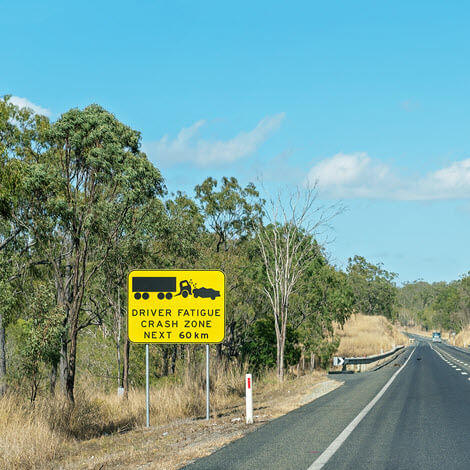
Houston Fatigued Driver Accident Lawyers
Holding truck drivers, trucking companies, and others accountable when drowsy driving cause accidents
There’s a saying: “time is money.” Many truck drivers and trucking companies drive while they’re tired because the more cargo they move, the more money they make. Many drivers are paid by the hour or by the mile. Either way, there is a built-in incentive for the driver to be on the road as much as possible. Trucking companies that handle shipments and inventory also have an incentive to make as many deliveries as possible, which keep their drivers on the road.
There’s also a follow-up saying: “Tired drivers are deadly drivers.” At Kishinevsky Law Firm, our Houston truck accident lawyers have the experience and resources to help you obtain justice after you’re seriously injured. We work with investigators, with the police, and through the discovery process to show how your truck accident happened. In cases involving driver fatigue, we examine the truck’s electronic logging records, the driver’s travel route, and many other factors to show a truck driver’s fatigue caused the accident. We also file claims against car drivers who drive while tired or drowsy.
Your questions, answered
-
How can we help?
- Why is driving drowsy so dangerous?
- What are the federal hours of service requirements for truck drivers?
- What records must truck drivers keep about their trips?
- How can drivers avoid driving while drowsy?
- Who is responsible for a Houston fatigued driver accident?
- Do you have a fatigued driver lawyer near me?

Why is driving while tired so dangerous?
Tired drivers are a danger to themselves and everyone else on the road. Some of the reasons why driver fatigue is dangerous are:
- Tired drivers cannot anticipate emergencies, such as when there are construction signs that lanes are merging ahead.
- Tired drivers also cannot react to emergencies in a timely manner. Part of the delayed reaction time is mental/cognitive. Fatigued drivers cannot process that there is an emergency and how they should respond as quickly as drivers who are fully awake. The time they need to push their foot to the brake or steer out of danger is longer if a driver is tired. A split-second can be the difference between life and death.
- Fatigued drivers are more apt than awake drivers to veer into other lanes of travel.
- Tired drivers are more likely to be distracted by actions they take to help them stay awake, like using one hand to drink coffee while they drive, or using their smartphone or stereo. Fatigue has been shown to lead to both reduced concentration and lower impulse control, so tired drivers are more likely to not fully focus their attention on the road and to be distracted by other things on which they are focusing their attention.
- Tired driving is one of the leading causes of severe accidents. According to the National Safety Council, each year in the United States tired driving accounts for approximately 100,000 crashes, 71,000 injuries, and over 1500 fatalities.
Drivers in Houston or anywhere else shouldn’t get on the road if they feel tired. If they’re already on the road when they start to feel tired, they pull over at a rest stop or someplace where they can sleep before they begin driving again.
What are the federal hours of service requirements for truck drivers?
The Federal Motor Carrier Safety Administration (FMCSA) has specific hours of service rules that regulate how long commercial truck drivers and drivers of other commercial vehicles can be on the road before they need to rest. There are different rules for drivers who are transporting property and drivers who are transporting passengers. Truck drivers who have cargo in their trucks must comply with the following requirements, among others:
- Drivers may drive up to 11 hours after being off-duty for 10 consecutive hours.
- Drivers “may not drive beyond the 14th consecutive hour after coming on duty, following 10 consecutive hours off duty. Off-duty time does not extend the 14-hour period.”
- Drivers must “take a 30-minute break when they have driven for a period of 8 cumulative hours without at least a 30-minute interruption.”
What records must truck drivers keep about their trips?
The US Department of Transportation requires that commercial truck drivers keep a logbook that keeps track of their hours behind the wheel. The records can be kept manually or through an electronic logging device (ELD). ELDs are connected to the truck engine and are recorded automatically.
These records are intended to make the roads safer by preventing drivers of trucks and other commercial vehicles from driving while fatigued, and the law requires drivers to pull over and rest for the required time period once they have reached their maximum consecutive driving time. If a driver is caught by a law enforcement officer exceeding their maximum hours driving without a rest or driving without having their logbooks in proper order, the officer may put the vehicle out of service and will require the driver to get the mandatory minimum amount of rest before they are allowed to continue driving the vehicle.
In examining how a crash with a truck or other commercial vehicle happened, our attorneys will often look to the driver log books if the driver was required to keep them to get more information about whether driver fatigue caused or contributed to the crash.
In situations where the law does not require a particular driver to keep logbooks to monitor the number of hours behind the wheel, there are other possible ways to determine if a driver was fatigued at the time of the crash and whether the driver being tired caused or contributed to the crash. These include the testimony of eyewitnesses, the activities of the driver, details of how the crash happened, details of the trip and route the driver was taking at the time of the crash, and others similar information.
How can drivers avoid driving while drowsy?
It’s not just truck drivers who are a danger to other vehicles and people on the road when they’re tired.
Bus drivers, train operators, taxi drivers, Uber and Lyft drivers, and other professional drivers owe a high duty of care to their passengers and all the others with whom they share the road. If a driver is tired, they are placing the lives of their passenger(s) and the occupants of the vehicles around them in jeopardy and their fatigue could cause a severe crash resulting catastrophic or permanent injuries, such as traumatic brain injuries, spinal cord damage, broken bones, burn injuries, and others. As professional drivers who make a living transporting people or cargo in their vehicles, these individuals have gone through additional training about driving safely and are generally more knowledgeable and experienced than civilian drivers, Along with that extra knowledge and training comes the responsibility to drive in a safe, careful, and mindful manner to make the roads as safe as possible for themselves, their passengers or cargo, and all of the other vehicles sharing the road with them.
Non-professional “civilian” drivers are not required to keep logbooks of how many hours they drove, nor do they receive the same level of training and instruction as most professional drivers. However, just like professional drivers, “regular” drivers can do their part to make the roads safer for themselves and the other vehicles sharing the road by avoiding fatigued driving. For extended trips, some of the easiest ways to do this are to periodically take a rest every few hours of driving and to periodically switch drivers if there are multiple qualified and licensed occupants of the vehicle. If a person feels significantly tired at the start of a trip, they should get some rest before getting behind the wheel. Likewise, if at some point while driving a person feels themselves starting to fall asleep, they should pull over immediately and either wake up by having some coffee and stretching if possible, or by giving themselves sufficient time to rest before continuing the drive.
Tired driving and fatigued driving is especially problematic in the greater Houston area. Many Houstonians have extended commutes to and from work in heavy traffic. The mental energy necessary to pay attention to heavy traffic on the commute home after a long day of work saps mental and physical energy. The fatigue from a hard day of work combined with the strain of having to pay close attention to heavy evening traffic only adds to the fatigue and stress of the commute and increases the dangers of an accident caused by tired driving.
Unfortunately, for some Houstonians, their day does not end after getting home from a hard day of work, as there are family obligations to be completed and errands that need to be done. For many of these hard-working individuals, their first impulse after getting home may be to immediately get back on the road and drive to complete their errands as quickly as possible so they can finally get some rest. While this way of thinking is certainly understandable, it is also dangerous. After the cumulative stress and fatigue of a full workday and a difficult commute, most individuals are likely physically and mentally exhausted and need to take some time to refresh and recharge before going back out on the road to run errands in the evening. Otherwise, they greatly increase the risk of causing a crash because of driving while fatigued, and create a danger of serious injury or worse to themselves, their passengers, and the occupants of the other vehicles on the road. Houston motorists who work all day should go home and rest before running errands if the work they do is tiring, rather than run errands on the way home. Drinking and driving can also cause fatigue, along with many other dangerous risks, such as reduced judgment and motor skills.
Who is responsible for a Houston fatigued driver accident?
The primary person responsible for driving accidents due to fatigue is the driver of the car, truck, or other vehicle that hit you. In addition, depending on who owned the other vehicle and what the driver of the vehicle was doing at the time of the crash, the following may also be liable for a Houston crash caused by tiredness:
- A trucking company that arranges the shipment or requests the shipment.
- The owner of the vehicle involved in the accident, either an individual or a company depending on the facts.
- An employer of the driver, if the driver was operating the vehicle during the scope of his/her employment, such as a local delivery driver or a salesperson.

Do you have a fatigued driver accident lawyer near me?
Our Houston drowsy driver accident lawyers meet clients at 13831 Northwest Fwy, Suite 312 in Houston. There’s plenty of parking. You can also reach Kishinevsky Law Firm by bus. If you’re not mobile, we will meet you at a healthcare facility, at your home, by telephone, or by Zoom. We’re here for you.
We’ll answer all your questions and guide you through each phase of the claims process. Many personal injury claims do settle, but we’re always ready to try your case before a jury if necessary.
Speak with our respected Houston fatigued driver accident attorneys now
Don’t delay. You have a limited time to file your claim, and our lawyers want to speak with everyone who has knowledge about the accident and how the driver’s fatigue led to your injuries while everyone’s memories are still fresh. At Kishinevsky Law Firm, our goal is to obtain full and maximum compensation for all your financial and non-economic damages, such as your pain and suffering. To schedule a free consultation, give our Houston office a call or fill out our contact form today. We handle personal injury claims on a contingency fee basis.
